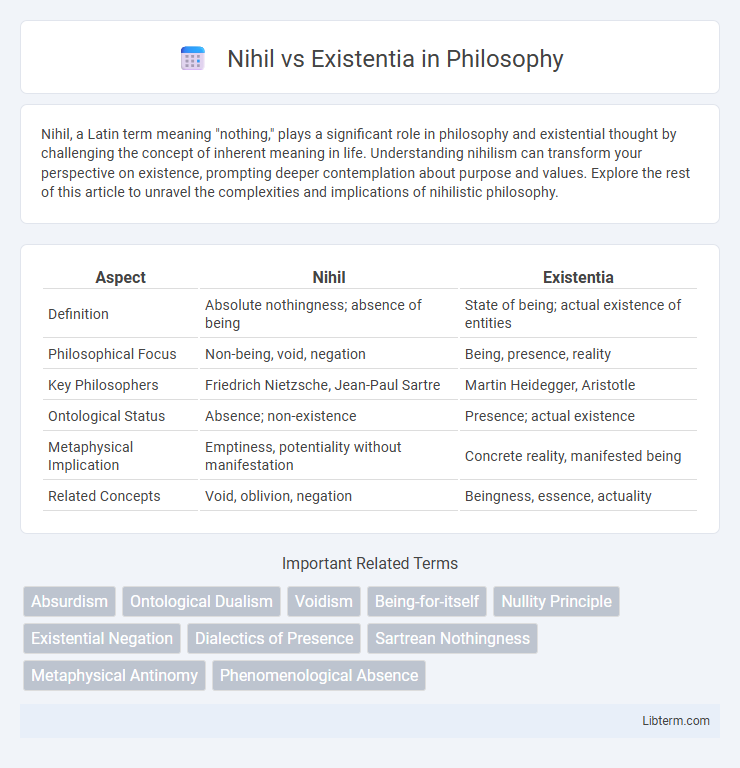Nihil, a Latin term meaning "nothing," plays a significant role in philosophy and existential thought by challenging the concept of inherent meaning in life. Understanding nihilism can transform your perspective on existence, prompting deeper contemplation about purpose and values. Explore the rest of this article to unravel the complexities and implications of nihilistic philosophy.
Table of Comparison
| Aspect | Nihil | Existentia |
|---|---|---|
| Definition | Absolute nothingness; absence of being | State of being; actual existence of entities |
| Philosophical Focus | Non-being, void, negation | Being, presence, reality |
| Key Philosophers | Friedrich Nietzsche, Jean-Paul Sartre | Martin Heidegger, Aristotle |
| Ontological Status | Absence; non-existence | Presence; actual existence |
| Metaphysical Implication | Emptiness, potentiality without manifestation | Concrete reality, manifested being |
| Related Concepts | Void, oblivion, negation | Beingness, essence, actuality |
Understanding Nihil and Existentia: Key Definitions
Nihil represents the concept of absolute nothingness, characterized by the absence of existence, matter, and meaning, often explored in metaphysics and existential philosophy. Existentia denotes the state or quality of being, encompassing all entities that have presence or reality within the universe. Understanding the contrast between Nihil and Existentia is essential in grasping fundamental discussions about existence, reality, and the nature of being.
Historical Roots: Origins of Nihil and Existentia
The historical roots of Nihil and Existentia trace back to classical philosophy, where Nihil emerged from the Latin term meaning "nothing," emphasizing void and non-being in ancient metaphysical debates. Existentia, derived from Latin meaning "existence," developed through Aristotelian and Scholastic traditions, highlighting being and reality as fundamental concepts. These origins shaped ongoing philosophical discourse, contrasting non-existence with existence as central ontological categories.
Philosophical Perspectives: Nihilism Explained
Nihilism, a philosophical doctrine asserting the negation of meaning, value, and existence, challenges traditional beliefs by denying inherent purpose in life or the universe. Existential nihilists argue that life lacks objective meaning, prompting an exploration of individual freedom and responsibility without predetermined moral frameworks. This perspective contrasts with other philosophies that affirm existence's significance, highlighting a fundamental tension between meaninglessness and the quest for purpose.
The Essence of Existentia: Existentialism Uncovered
Existentia embodies the core principles of existentialism, emphasizing individual freedom, authentic existence, and the creation of personal meaning amidst an indifferent universe. Unlike Nihil, which denies inherent purpose, Existentia embraces the responsibility of self-definition and the pursuit of essence through lived experience. This philosophical stance highlights the tension between absurdity and the human capacity for meaning-making, central to existential thought.
Contrasting Worldviews: Nihil vs. Existentia
Nihil represents a worldview grounded in the rejection of inherent meaning or value, emphasizing existential emptiness and the absence of objective purpose. In contrast, Existentia affirms the presence of intrinsic meaning, valuing individual existence and the pursuit of authentic experience. The discord between Nihil and Existentia centers on whether life's significance is self-generated or fundamentally void.
Impact on Society and Culture
Nihil vs Existentia explores the profound impact of existential philosophy on society and culture, emphasizing how the recognition of nothingness influences individual purpose and collective values. This philosophical dichotomy shapes modern art, literature, and social movements by challenging traditional narratives and encouraging introspection about existence and meaning. Communities influenced by existential thought often experience a shift toward authentic self-expression and reevaluation of cultural norms.
Nihil and Existentia in Modern Thought
Nihil in modern thought represents the concept of absolute nothingness, often linked to existential void and the negation of meaning. Existentia, conversely, emphasizes the reality of being and conscious existence, highlighting subjective experience and self-awareness. The dynamic tension between Nihil and Existentia shapes contemporary philosophical discussions on meaning, identity, and the human condition.
Literary and Artistic Interpretations
Nihil vs Existentia emerges as a profound thematic exploration in contemporary literature and visual arts, symbolizing the conflict between nothingness and being. Literary works often employ nihilistic motifs to question existential meaning, while artistic interpretations visualize this dichotomy through contrasting forms, shadows, and voids. This conceptual interplay fosters a deeper understanding of human existence, blending philosophy with creative expression to challenge perceptions of reality.
Real-life Implications: Living Nihil or Existentia
Choosing Nihil or Existentia profoundly affects mental well-being and decision-making patterns; Nihil often leads to existential despair or radical freedom, while Existentia fosters purpose and structured goals. In real life, embracing Nihil may result in detachment or creative liberation, whereas living through Existentia encourages social engagement and resilience. Cognitive-behavioral studies show that individuals aligning with Existentialist values typically report higher life satisfaction and adaptive coping mechanisms.
Synthesis and Future Directions
Nihil and Existentia represent opposing metaphysical paradigms, with Nihil emphasizing void and absence, while Existentia centers on being and presence. The synthesis of these perspectives fosters a dialectical approach where existence arises through the interplay of negation and affirmation, informing contemporary ontological frameworks. Future directions involve integrating quantum metaphysics and cognitive science to explore how consciousness shapes the boundary between nothingness and being.
Nihil Infographic

 libterm.com
libterm.com